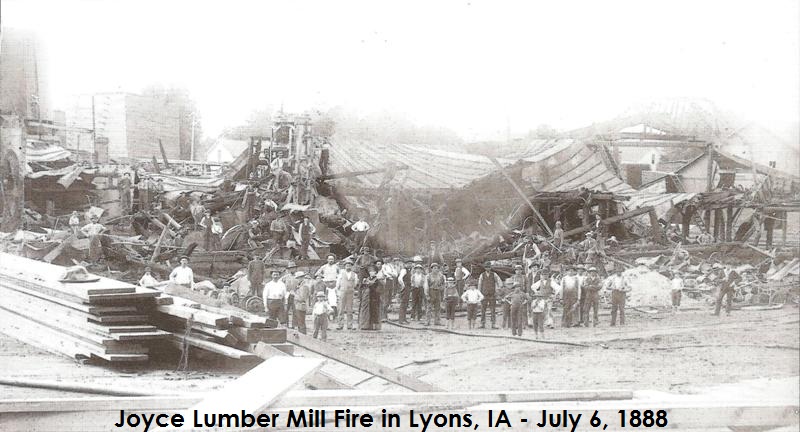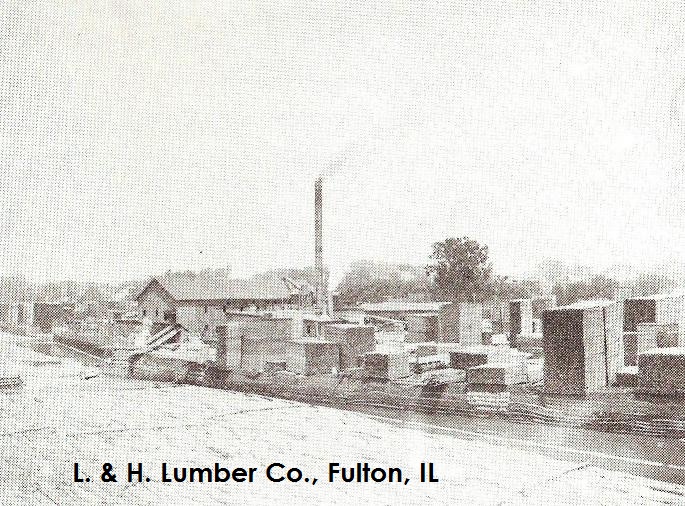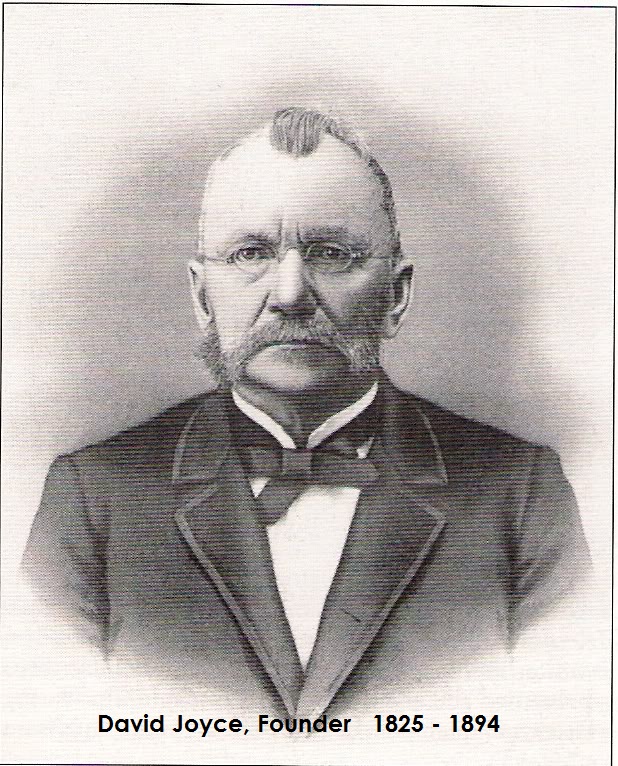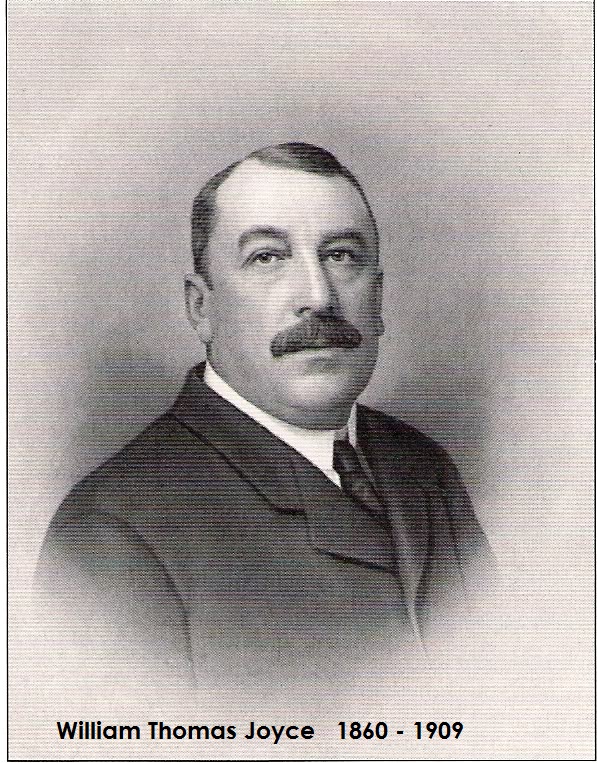Joyce Lumber Mill Inferno of 1888
From: The Clinton Daily Herald; Saturday, July 7, 1888, P. 7
Transcribed by a Clinton County IaGenWeb volunteer.
LYONS.
CINDERS AND ASHES.
Remain to Mark the Place Where Stood David Joyce’s Saw Mill Friday.
The Mill and Lumber Valued at Over $75,000 Go Up In Smoke.
The L & H Co.’s Yards at Fulton, a Mile Away Catch Fire Several Times.
Heroic, Hard-Working Firemen and Mill Employees – Poor Families Mournful – The
Insurance.
 Assistant Engineer M. J. Quinn, and Messrs. Johnny McKenna, Will Sadler, Art
Booth and Al. Pelton, employees of David Joyce at his saw mill in the south part
of the city on the river, were making repairs to the gang saws Friday evening,
when Mr. Quinn saw a flame burst up at the bench of the “cut-off” saw in the
planing room of the mill. His first effort was to smother the blaze, but he
might as well have tried to turn a tornado from its course, for in an instant
flames were leaping about the entire room in seeming fiendish glee. The other
men mentioned above immediately ran for the hose, always attached to hydrants
near by. Some grasped the nozzle and ran with it to the fire, another running to
the hydrant only 20 or 30 feet away from the door of the room to turn on the
water. The rapidity with which the flames sprang from one part of the room to
another was alarming, for before the water had been brought to bear on the
blaze, not over a minute at the longest, the entire room was a seething furnace,
so hot the men could scarcely play upon the fire with the water pipe Mr. Quinn,
in the meantime, had gone to the engine room where he was preceded by the
flames, however, which ran to every corner of the mill with wings of wind. He
grasped the whistle cord and the alarm was sounded. At nearly the same time the
flames bursted from the building and then such a scene as was witnessed by the
gathering hundreds of people in the neighborhood and from other parts of the
city will not soon be forgotten.
Assistant Engineer M. J. Quinn, and Messrs. Johnny McKenna, Will Sadler, Art
Booth and Al. Pelton, employees of David Joyce at his saw mill in the south part
of the city on the river, were making repairs to the gang saws Friday evening,
when Mr. Quinn saw a flame burst up at the bench of the “cut-off” saw in the
planing room of the mill. His first effort was to smother the blaze, but he
might as well have tried to turn a tornado from its course, for in an instant
flames were leaping about the entire room in seeming fiendish glee. The other
men mentioned above immediately ran for the hose, always attached to hydrants
near by. Some grasped the nozzle and ran with it to the fire, another running to
the hydrant only 20 or 30 feet away from the door of the room to turn on the
water. The rapidity with which the flames sprang from one part of the room to
another was alarming, for before the water had been brought to bear on the
blaze, not over a minute at the longest, the entire room was a seething furnace,
so hot the men could scarcely play upon the fire with the water pipe Mr. Quinn,
in the meantime, had gone to the engine room where he was preceded by the
flames, however, which ran to every corner of the mill with wings of wind. He
grasped the whistle cord and the alarm was sounded. At nearly the same time the
flames bursted from the building and then such a scene as was witnessed by the
gathering hundreds of people in the neighborhood and from other parts of the
city will not soon be forgotten.
The roar and crackling of the flames, the falling of timbers, the tall smoke
stack being seen occasionally through the pillar of smoke, steam and flame, the
wives and daughters of the men who depended on work at the mill for daily bread
standing in groups weeping because of the sympathy with Mr. Joyce at his loss
and with forebodings of idle days this summer and scanty food next winter, made
even the stout hearts of men beat faster in sympathy.
Yet on and on went the flames, leaping from mill to lumber piles to be checked
for a moment by heroic firemen who had promptly gathered from all over the city,
then to spring heavenward hundreds of feet, driving the nearly exhausted men
back, they being relieved by others who, protected by doors taken from the sash
factory to ward off the intense heat, would advance on the flames, to be
themselves driven back nearly or quite exhausted.
 Thus the situation remained from 10 till 11:30. Before 11 the mill timbers had
fallen and the fight was a hard one with the flames in the giant dry lumber
piles just north of the mill. Anxiously was this section watched, the great fear
being that the flames would get past the firemen and sweep the entire north
yard, some blocks in extent, where thousands of feet of valuable lumber is
piled. But persistent and hard work with 11 strong streams of water from the
Lyons Water Works system, forced through the main, with the two large pumps at
the water works, which were run at such speed as to cause a pressure of ninety
pounds, made the fearful fire give way about 11:30, full two hours after it
began, and for the first time it was thought the yards could be saved. Yet hard
work was required and not until this forenoon was the fire put out.
Thus the situation remained from 10 till 11:30. Before 11 the mill timbers had
fallen and the fight was a hard one with the flames in the giant dry lumber
piles just north of the mill. Anxiously was this section watched, the great fear
being that the flames would get past the firemen and sweep the entire north
yard, some blocks in extent, where thousands of feet of valuable lumber is
piled. But persistent and hard work with 11 strong streams of water from the
Lyons Water Works system, forced through the main, with the two large pumps at
the water works, which were run at such speed as to cause a pressure of ninety
pounds, made the fearful fire give way about 11:30, full two hours after it
began, and for the first time it was thought the yards could be saved. Yet hard
work was required and not until this forenoon was the fire put out.
Some idea of the intense heat can be obtained by knowing that when water would
fall on the heated machinery in the mill it would instantly boil.
During this intense heat a timber fell on the whistle cord opening the valve and
its mournful tones, as the steam escaped, made the situation soul-harrowing.
Assistant Engineer Quinn, who had charge of the men on the south part of the
mill, thought, as did others, that the boilers, a battery of several large ones,
must soon blow up , when many of the hundreds of people gathered around would
have been maimed or killed outright. So, with true heroism, perhaps some may
call it a far different name, he ran into the boiler room, the timbers, roof and
all being in flames, and while a stream of water played on him he put a ladder,
(even that being in flames) up against the side of a boiler, mounted on the
steam generators then swaying from side to side with the power of the steam
within, ran over the top of them to the safety valve, grasped the heated weight
in his hands and shoved it from the 120 pound notch to the ten pound pressure
and thus opened the steam escape, saving the boilers and the lives of those
about at the risk of his own life, miraculously receiving no injury but the
burning of the insides of both his hands. His strength was that born of
desperation, nearly, for after moving the safety valve weight he grasped the
heated whistle cord, made of twisted wire, which was held down with a burning
timber, and pulled on it so forcibly that it broke, closing the whistle.
While the war with flames was going on here, over in Fulton, across the
Mississippi and some distance further north, the Fulton people were fighting
fire in the L. & H. Co.’s lumber yard, which caught three times from embers
blown across from the burning mill. The sight from a distance was a grand one
for the flames and flying sparks swept over the river in a shower, lighting up
its glassy surface for several miles.
The loss falls not alone on Mr. Joyce, whose property, to the value of at least
$75,000, was destroyed, but also the workmen are losers. Mr. John McKenna, who
was at work in the mill, had just taken off a $35 suit of clothes and put on his
mill suit. This, with a gold watch and other articles in his pockets was a total
loss, the works of the watch being found this morning. Art Booth also lost a
watch, and the men who worked in the mill lose all their own tools.
The principal articles lost are:
The saw mill.
The planing mill.
The shaving house.
The runways.
The gang and other saws.
The planing machines.
The electric light plant.
All the small machinery.
The engines.
And several piles of lumber.
In the mill the water heater was saved, as were the boilers, and the little
engine room, the water tank, the fire room, all but the roof and the smoke
stack.
The fire, owing to a gentle breeze from the west, did not cross the track to the
dry shed, office and sash factory, or the loss would have been very heavy
indeed.
The firemen of the two cities did noble work, responding to the alarm promptly,
a large number of them working all night. When a call was made to Clinton for
help the response came soon and the boys did all they could to quell the
conflagration, some of whom, like the earnest working Lyons firemen, becoming
exhausted, after a rest going back and reporting for duty. To the admirable
water works system of Lyons, whose superintendant and manager gave it their
personal attention, and to the gallant firemen and others is great credit due.

 Mr. David Joyce was in the north, and when the flames were under control he was
telegraphed. Mr. Will Joyce was seemingly everywhere, as was the manager of the
mill and business here, Mr. Joe Conway, directing the men, securing help, and
sparing no expense, while Mr. McArthur, the efficient book-keeper, was in charge
of the offices ready to empty the vault of books and papers if the offices took
fire. Every employee seemed to be in place and each worked as though it was his
property being destroyed. It was a nobly fought battle well won.
Mr. David Joyce was in the north, and when the flames were under control he was
telegraphed. Mr. Will Joyce was seemingly everywhere, as was the manager of the
mill and business here, Mr. Joe Conway, directing the men, securing help, and
sparing no expense, while Mr. McArthur, the efficient book-keeper, was in charge
of the offices ready to empty the vault of books and papers if the offices took
fire. Every employee seemed to be in place and each worked as though it was his
property being destroyed. It was a nobly fought battle well won.
The other mill men of the city hurried to the fire and kindly and generously
placed any of their fire apparatus or men at the command of Mr. Joyce.
For him the Herald extends sincere thanks to all, who, either by work or
presence, rendered aid, as well as to those who are sympathizing with him and
his workmen at their loss to-day.
The cause of the fire is not known, but it is supposed to have been started in
some manner from a hot box in one of the machines.
Some idea of Mr. Joyce’s nature can be gained from a telegram received from him
to-day in answer to one sent informing him of the fire. It reads as follows:
Shell Lake, July 7. – Send further particulars. Was anyone injured?
The insurance is about one-fifth the loss, and was placed in the following
companies:
Manufacturers Mutual of St. Louis…..$2,500
Reliance Mutual of Dubuque……$1,500
Lumberman Manufacturers of Eau Claire……$5,000
Mutual Fire Association of Eau Claire……$5,000
Manufacturers of Milwaukee……$1,000
As Mr. Joyce is absent from the city it is not known whether he will rebuild or
not, but there is a fear entertained by those who are most familiar with his
plans that he will erect nothing more than a planing mill.
NOTE: In the aftermath, work immediately began to rebuild the mill.

